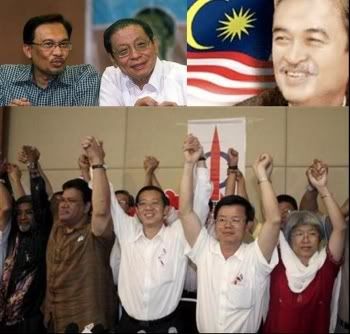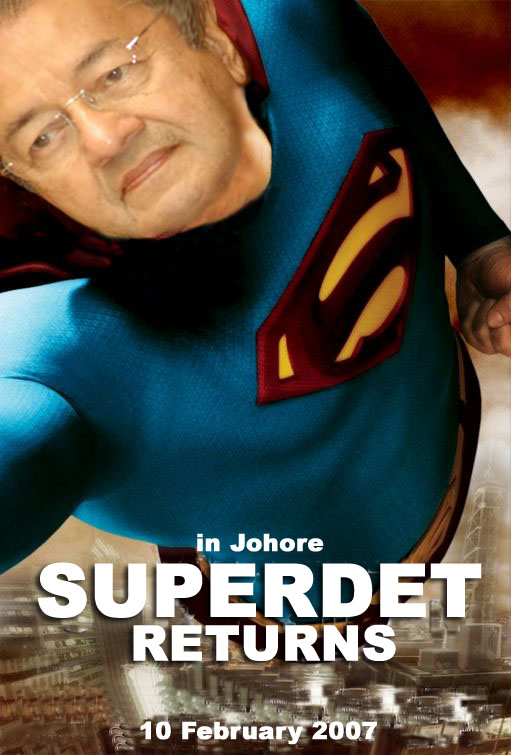Did bloggers really create the Malaysian tsunami?
 This is a well-written commentary by a former journalist in Singapore's TODAY newspaper today. Cherian George looks at the role of the Internet and blogs during the watershed elections in Malaysia this month.
This is a well-written commentary by a former journalist in Singapore's TODAY newspaper today. Cherian George looks at the role of the Internet and blogs during the watershed elections in Malaysia this month.
It's a timely reminder that bloggers only play one part in the big scheme of things. Bloggers on both sides of the causeway will never replace mainstream media, despite general unhappiness with the two governments' mouthpieces on certain key issues.
But ultimately, editors and writers -- whether they are in the mainstream media or blogosphere -- must be credible. Both platforms also need to engage each other more frequently to give a more complete picture to people in Singapore and Malaysia.
Did bloggers really create the tsunami?
Cherian George
March 29, 2008
MALAYSIAN Prime Minister Abdullah Ahmad Badawi's admission this week that his government did not pay enough attention to the Internet is one of the sexiest explanations yet for its shock defeats in the recent elections.
Perhaps bloggers will now replace bomohs as the suspects of choice behind bizarre political phenomena like those witnessed on March 8.
Some of the hype around this admittedly magical technology is justified. By dramatically lowering the barriers to entry for wide communication and collaboration, the Internet is quite simply the most powerful platform for innovation — including political innovation — in the history of civilisation.
However, every sober analysis of its impact since the Internet's mid-1990s "big bang" has come to the same conclusion: The technology is not powerful in isolation; the World Wide Web weaves its wonders only in concert with other old-fashioned forces.
Thus, the vibrancy of Internet politics in Malaysia is very much a reflection of an offline environment of lively opposition politics and civil society activism. Mr Jeff Ooi — Malaysia's mr brown — could transition from blogger to victorious parliamentary candidate because the Democratic Action Party was well placed to harness his popularity.
Similarly, aliran.com was able to churn out influential reports because it is backed by the established Penang-based human rights non-governmental organisation, Aliran. Less savoury attributes of Malaysian cyberspace, such as its poison pen practices, are also rooted in the country's offline traditions.
Internet power should also be seen in the context of the wider media environment. While media companies are often wedded to one medium or another, most users are promiscuous by instinct.
They flit between media, each promising its own uses and gratifications — perhaps a newspaper for comprehensive news, television news for its pictures, a blog for personal insight, an activist's website for biting commentary, SMS for the latest gossip or joke, coffeeshop talk to share their own views, rally attendance for a sense of community, and so on.
If people suddenly gravitate towards one medium, it is often because another has failed to meet their expectations. This is certainly the case in Malaysia, where the crippling of the mainstream media by government control is the main reason why Malaysians have flocked online.
Even the editors of the leading independent site Malaysiakini humbly concede that their success isn't because they are so great — they are still resource-poor by news organisation standards — but because their mainstream rivals are found wanting.
Therefore, the government's fundamental mistake was not that it neglected cyberspace, as claimed by the Prime Minister, but that it failed to address offline problems — which were then exposed and exploited by Internet-empowered opponents.
Officials should have learnt from the Reformasi protests of almost a decade ago, when its mainstream media stranglehold resulted in media coverage out of sync with the public mood, with massive losses in newspaper circulation and a windfall for alternative websites such as Malaysiakini and Harakah Daily.
Now, officials are talking of courting independent bloggers or investing in their own. But this will not fix the real problem of inadequate respect for freedom of expression, resulting in a lack of credibility for all media linked to the state. Comparisons with Singapore — Malaysia's fraternal twin — are irresistible.
If even the Malaysian Prime Minister has acknowledged the political impact of the Internet, does that not make Singapore — with its far greater Internet penetration levels — ripe for its own electoral tsunami? Only if one imagines the Internet to be some kind of magical force, which it isn't.
Distilling more thoughtful analyses of the Malaysian elections, 2008 appears to mark a tipping point at which voters decided that poor governance was no longer tolerable. The ruling alliance — and practically everyone else — had expected racial loyalties and a controlled mass media to compensate for its failures and inefficiencies.
But a threshold appears to have been reached, indicating that ideological advantages are finite, while good governance is all. Like Malaysia, Singapore is run by a dominant political party that believes that the media's role is not to set the political, social and economic agenda. That is to be left to the elected leaders of the day. Instead, the media is seen as a partner in nation building.
The People's Action Party has generally not used its ideological control as a substitute for performance, but rather to give policy-makers a buffer against interference by interest groups and dissenting voices, allowing them to frame the agenda and manage public opinion in the short term.
Long-term legitimacy has been built on the tangible success of its policies. The drift from the controlled mainstream to freer alternative media has therefore been much less evident in Singapore than in Malaysia.
Another major difference is that Singapore's alternative media doesn't have the thick soil that their Malaysian counterparts thrive in. The political environment in Singapore is more predictable and sanitised in a way that Malaysia's never was.
This is reflected in the two societies' alternative media: Malaysia's are more organised, mobilised and committed. Malaysia shows that determined activists can amplify their impact with the Internet. But Singapore shows that the Internet cannot electroshock an otherwise quiescent public into action, no matter how well wired it is.
Cherian George is an Assistant Professor at the Wee Kim Wee School of Communication and Information, NTU, and the author of Contentious Journalism and the Internet: Towards Democratic Discourse in Malaysia and Singapore (Singapore University Press, 2006).
Another good commentary: Hope spreads from tsunami, The Star (March 29, 2008)



 United Malaysian Bloggers. More pix on
United Malaysian Bloggers. More pix on 


